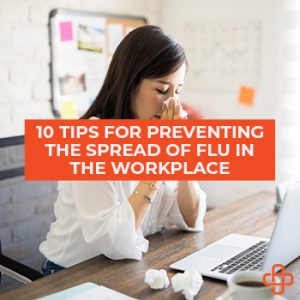 Employees are a crucial resource in any business. As recommended by the CDC, there are steps you can take now, and during the flu season, to help protect the health of your employees.
Employees are a crucial resource in any business. As recommended by the CDC, there are steps you can take now, and during the flu season, to help protect the health of your employees.
10 Tips for Preventing the Spread of Flu
- Encourage all employees to get a seasonal flu vaccine each fall. CDC recommends everyone 6 months and older get an annual flu vaccine.
- Consider hosting a flu vaccine clinic at your workplace, if possible. Provide resources to employees about where they can get a flu vaccine in their community. The vaccine finder application is a free online service to search for vaccines in your areas: https://vaccinefinder.org/External
- Develop and review sick leave policies that encourage sick workers to stay at home without fear of any reprisals.
- Advise all employees to stay home if they are sick until at least 24 hours after their fever* (temperature of 100 degrees Fahrenheit or 37.8 degrees Celsius or higher) is gone without the use of fever-reducing medicines.
- Sick employees should be asked to go home. Employees who appear to have flu symptoms upon arrival or become sick during the workday should be promptly separated from others and asked to go home.
- Develop other flexible policies to allow workers to telework (if feasible) and create other leave policies to allow workers to stay home to care for sick family members or care for children if schools close.
- Instruct employees who are well, but who have a sick family member at home with the flu, that they can go to work as usual. These employees should monitor their health every day, and notify their supervisor and stay home if they become sick. Employees who have a certain underlying medical condition or who are pregnant should promptly call their health care provider for advice if they become sick.
- Provide resources and a work environment that promotes preventive actions to reduce the spread of flu. For example, provide tissues, no-touch trash cans, hand soap, and/or hand sanitizer.
- Provide workers with up-to-date information on flu risk factors and preventive actions. For example,
- Encourage respiratory etiquette by providing education and reminders about covering coughs and sneezes with tissues, and easy access to tissues and trash cans.
- Encourage hand hygiene by providing education and reminders about washing their hands, and easy access to running water and soap or alcohol-based hand rubs.
- Provide resources and education about employees who may be at high risk for serious flu complications, such as pregnant women or adults with a chronic medical condition such as asthma, heart disease, or diabetes. Flu vaccination is especially important for people at high risk for flu complications. Individuals at high risk for flu complications should seek medical attention right away if they do become sick with flu.

Holly is an ER nurse by trade, but loves content marketing. She was born outside the box and believes everything is better with “sprinkles and sparkles”. She is passionate about impacting lives and uses marketing as her platform for sharing practical solutions to address real life occupational health challenges.
Find out more about our Injury Case Management services or our Occupational Health Programs.










